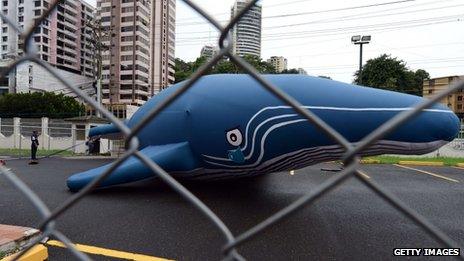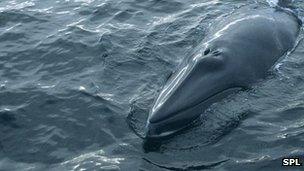South Korea's whaling: Faux and cons
- Published
- comments

Activists protest at the IWC in Panama City
This is the eighth meeting of the International Whaling Commission (IWC), external that I've covered; so I'm always a bit chary of the possibility that over time I've become a more grumpy, wizened, curmudgeonly old cynic than the organisation's politics might merit.
So it's been refreshing to chat with a few first-timers this year - and confirmatory that some of them, after just three days of what's been a functional meeting by recent standards, already find the waters of hypocrisy and selective memory running deep and strong.
What's got the waters flowing stronger then ever is South Korea's proposal to begin whaling around its coast under regulations permitting hunting for scientific research.
Is science the rationale? South Korea's own statement, external here suggests it's not, admitting that pressure is coming from fishermen who say whales are eating too many fish, lowering their catches.
These are the same fishermen from communities near the town of Ulsan who routinely snare whales in their fishing nets, external, accidentally or not - perhaps as many as 150 per year - and are allowed under South Korean law to sell the meat to markets and restaurants.

Some minke whale stocks around South Korea are already severely depleted
The logical thing from their point of view would be to regularise what happens anyway, and make the hunting easier.
That was the implication of a submission that South Korea made a few years back as part of the "IWC peace process"; if Japanese villagers were allowed to hunt whales as part of an eventual compromise deal, they said, Koreans would demand the same right.
The peace process came to naught; but it's hard to escape the conclusion that the desire to satisfy a small but genuine whaling community is the real drive behind the scientific whaling proposal too, particularly with an election looming in December.
But whether or not the South Koreans really intend to go ahead with the plan, it's been easy for them to construct a case for it.
In the debate that followed the South Korean revelation here, delegate after delegate from anti-whaling governments cited and lauded the commercial whaling moratorium, external that their predecessors voted through in 1982.
Strangely, they all forgot to mention the bit of the moratorium wording where they promised to review it.
The South Koreans were happy to remind them; and to help any still suffering from the collective amnesia, it goes like this:
"This provision will be kept under review, based upon the best scientific advice, and by 1990 at the latest the Commission will undertake a comprehensive assessment of the effects of this decision on whale stocks and consider modification of this provision and the establishment of other catch limits".
Countries like South Korea and Japan are still waiting. Some whale stocks have indeed been re-assessed; but "considering modification" is not on the agenda of most IWC members, and they have no hesitation in making clear that it never will be.
Australia's commissioner Donna Petrochenko, for example, was as forthright as her populace would demand in declaring that "Australia is resolutely opposed to commercial whaling in any form" and "strongly supports the moratorium".
But that statement also makes clear that her government has no intention of honouring the international pledge it made 30 years ago. Nor does the US, UK, Germany, the Seychelles - yes, the Seychelles played a key role - or the rest of the roll call.
From a modern democratic point of view, they're quite right.
The world, as many say, has moved on, and a majority see whales as creatures to be hugged rather than harpooned. Few governments in Europe or Latin America would see their popularity rise by pledging to re-open the global whaling ban.
But what does it say to communities in South Korea, Japan, Greenland and so on who see whale hunting as quite normal?
South Korea mustered other arguments too.
On Tuesday, IWC governments voted to allow the Bequians of St Vincent and the Grenadines to continue hunting whales under "aboriginal subsistence" rules, external, designed for peoples with an established tradition.
The Bequians' tradition dates back about 130 years, to the time when Yankee whalers taught them how to do it.
Korea's, meanwhile, dates back 8-9,000 years, external - the oldest documented anywhere on the planet - with ancient rock art showing the unmistakeable coming together of harpoon and whale, and piles of bones testifying to their consumption.
But Koreans, unlike Bequians, aren't allowed to hunt anymore.
Both decisions are made according to the rules; but that's only OK if you think the rules are OK, which the Koreans don't.
The Korean "whales eat fish" argument is one of the most easily debunked in the book, and I'm sure the Koreans know it - as must the Japanese officials who used to deploy it as a justification for whaling.
But when anti-whaling countries here pointed out that it's nonsense, did they also recall that they had a chance four years ago, external to get Japan's signature on a conference motion saying it was nonsense, and blew it?
One delegate from a government that spoke vehemently in public against the South Korean proposal put it like this in private: "They're just frustrated".
And it makes scientific whaling their only legal option.
Are the Koreans genuinely intending to do it?
It's hard to tell. But what is clear is that the IWC's tangled and often conveniently forgotten history gives them reasons for real frustration, and the wherewithal to construct faux frustration if they choose.
As the Korean proposal puts it: "Good faith and pacta sunt servanda ('agreements must be kept') constitute the two fundamental principles of international relations."
Really?